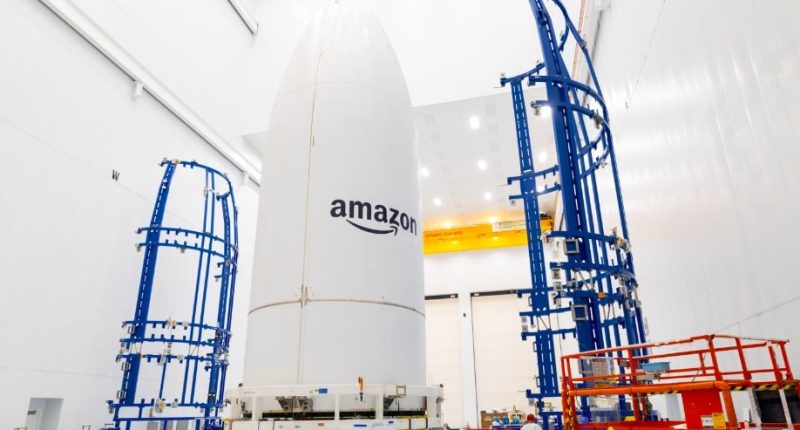E-commerce behemoth Amazon has now marked a major milestone in its ambitious ‘Project Kuiper’ initiative by successfully launching 27 satellites into low Earth orbit (~ 280 miles or 450 kilometers above Earth). From there, these satellites manoeuvre themselves to move higher up into space, reaching their final position at about 392 miles (630 kilometers) above Earth. These satellites were deployed via a United Launch Alliance (ULA) Atlas V rocket from Cape Canaveral, Florida.
Each satellite is equipped with optical inter-satellite links (OISLs), allowing them to communicate with one another using infrared lasers. These links can maintain data transfer speeds of up to 100 Gbps over distances up to 2,600 kilometers, even as satellites travel at speeds of around 25,000 km/h. Notably, Earth orbit satellites aimed at providing high-speed global internet service, positioning it as a competitor to SpaceX’s Starlink.
Project Kuiper is Amazon’s $10 billion initiative to deploy a constellation of 3,236 satellites aimed at providing global, high-speed, and affordable internet connectivity, particularly targeting underserved and remote regions. The recent deployment follows the earlier launch of two prototype satellites in 2023.
The company has secured agreements for more than 80 launches with providers including ULA, Arianespace, and Blue Origin. Several reports suggest that, after this latest launch, there are plans for 7 additional Atlas V launches and 38 launches on ULA’s larger Vulcan Centaur rocket.
But despite these efforts, Amazon is currently trailing behind Elon Musk-owned Starlink, which has launched over 8,000 satellites and gained more than 5 million users across 125 countries. Although Amazon believes that its expertise in web services and consumer products will provide a competitive advantage in the satellite internet market.
Amazon plans to commence customer pilots by the end of 2025, with full-scale commercial operations to follow. It is important to note that the Federal Communications Commission (FCC) mandates that half of the Kuiper constellation be operational by mid-2026. But given the current pace, meeting this deadline appears challenging, and the company may seek an extension.
Meanwhile, industry experts believe that Project Kuiper could result in significant expenses for Amazon, with estimates of up to $1.5 billion in 2025 alone. Along with financial challenges, the company faced legal troubles as well. In 2023, a shareholder’s lawsuit alleged that Amazon’s board did not satisfactorily consider SpaceX as a launch provider despite its established track record of reliability, possibly due to competitive dynamics.
Earlier this year (2025), Amazon filed a lawsuit against the Washington State Department of Labour & Industries to prevent the release of records related to its Project Kuiper satellite internet initiative to The Washington Post (which is owned by Amazon founder Jeff Bezos), claiming the documents contain trade secrets.
The Tech Portal is published by Blue Box Media Private Limited. Our investors have no influence over our reporting. Read our full Ownership and Funding Disclosure →






